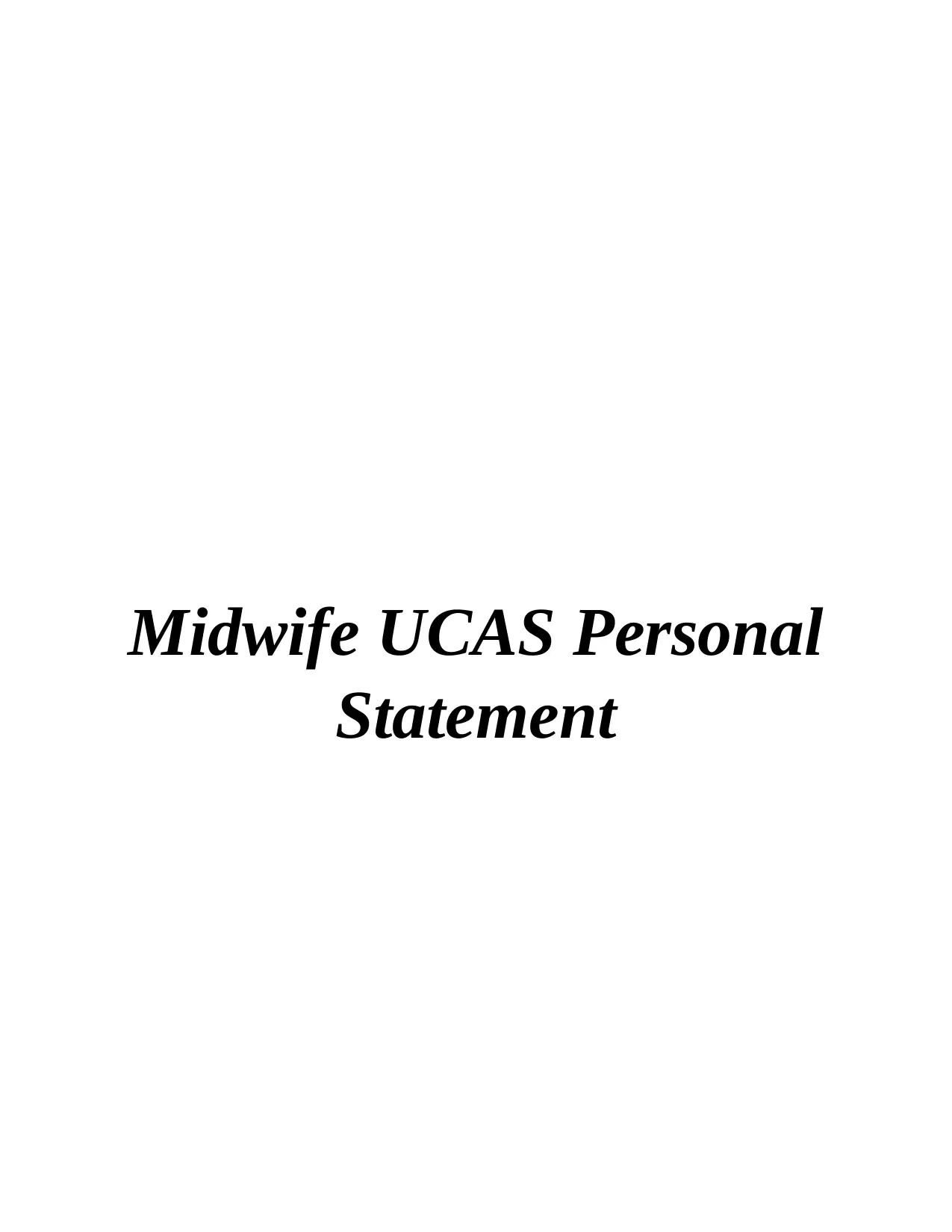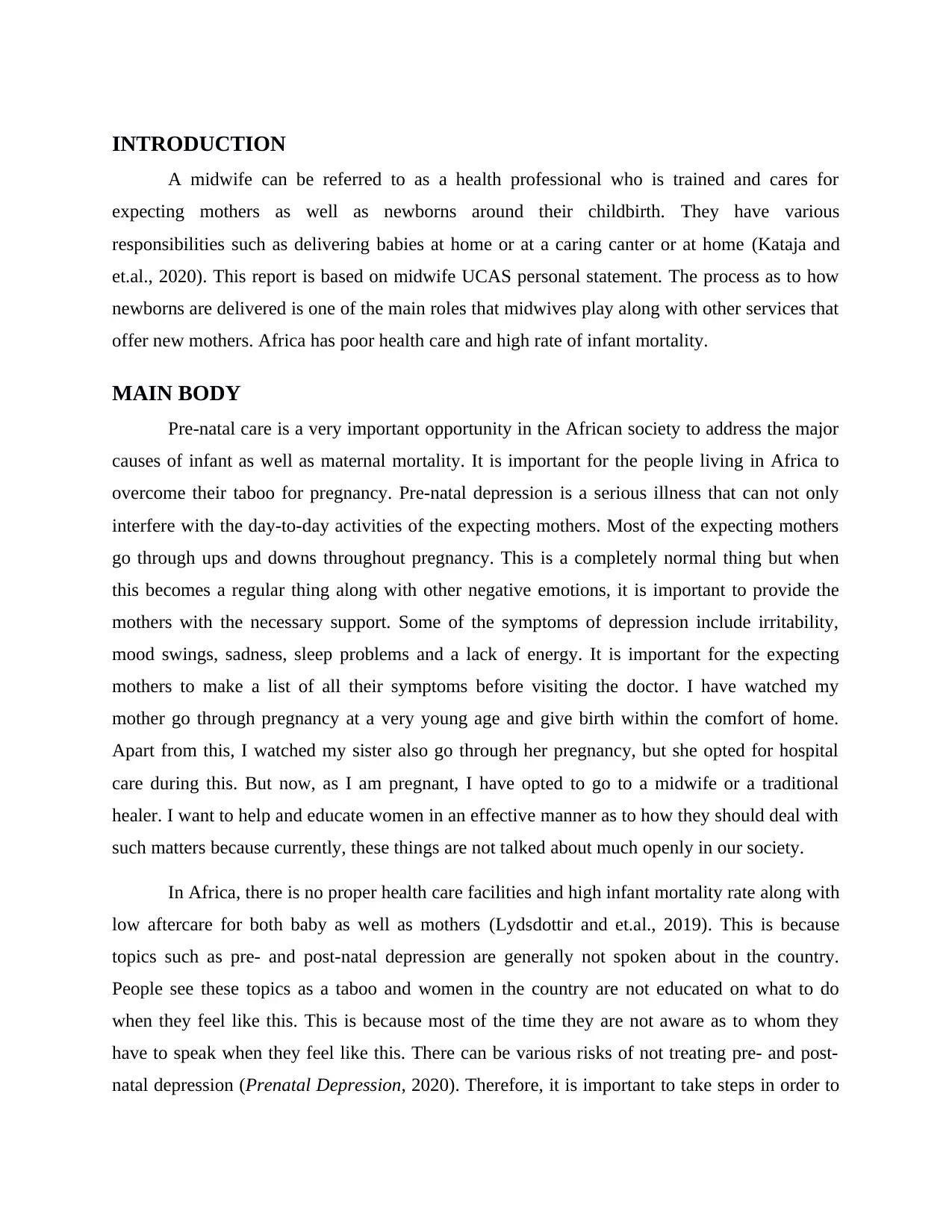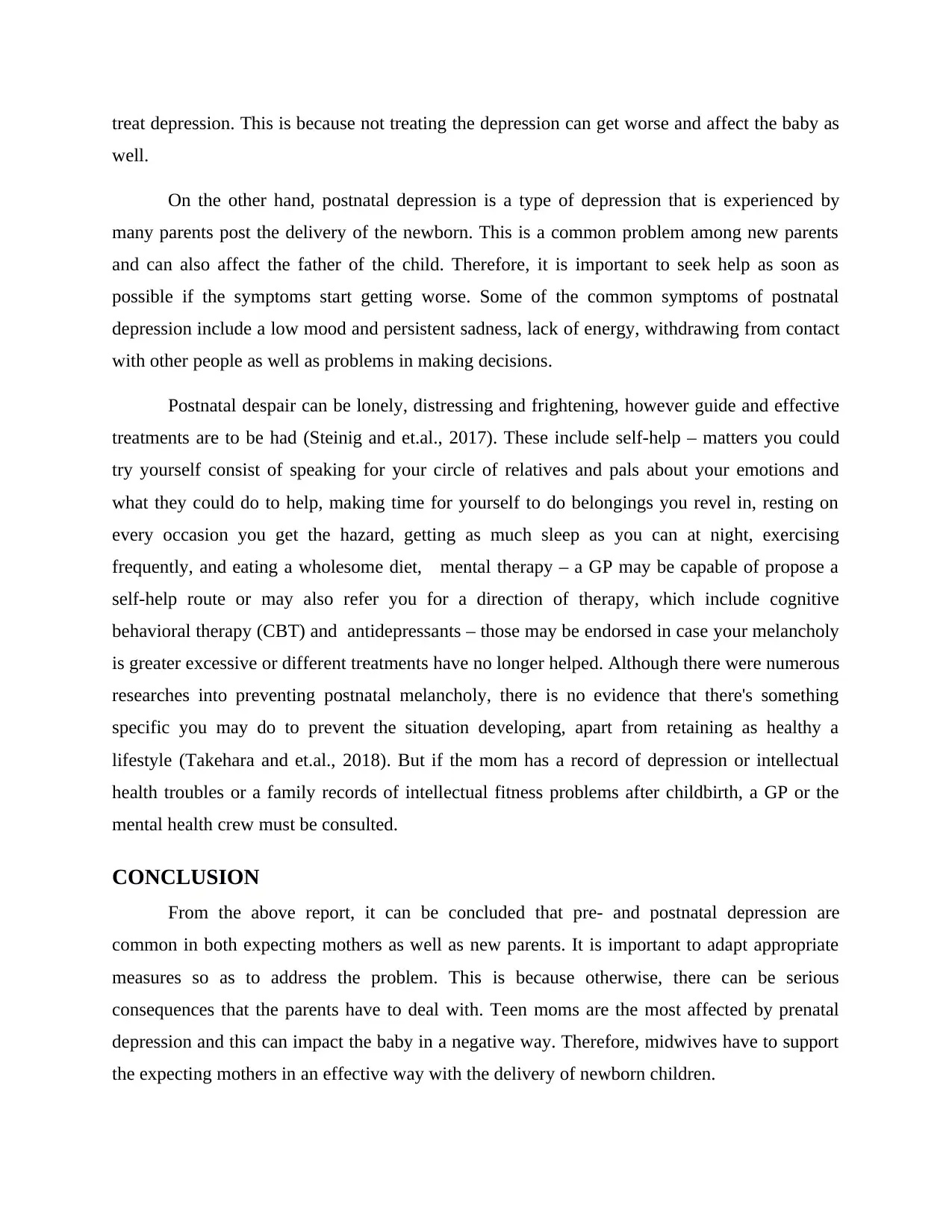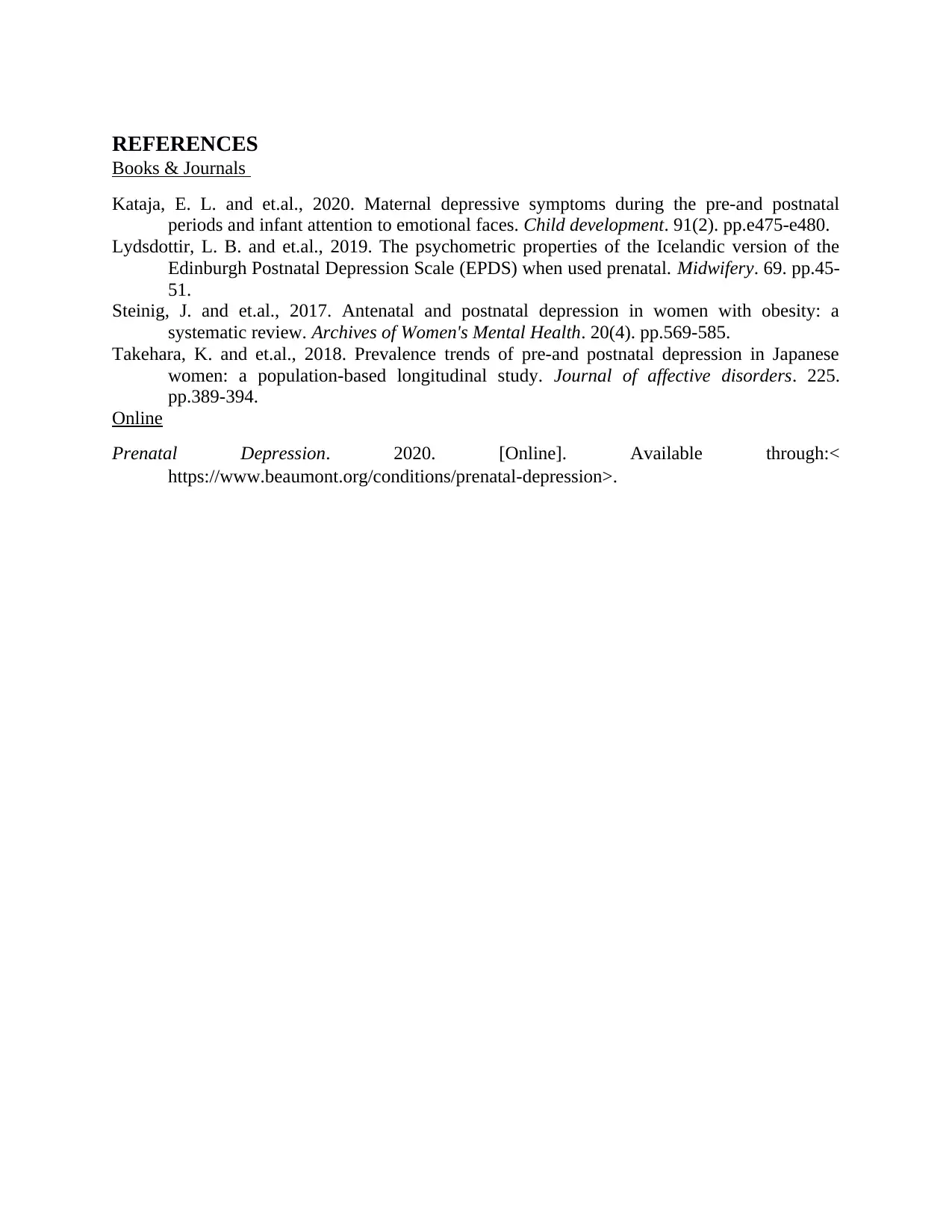Midwife UCAS Personal Statement: Prenatal Care in Africa
VerifiedAdded on 2023/01/03
|5
|1100
|96
Essay
AI Summary
This assignment is a personal statement for a UCAS application, focusing on the role of a midwife, particularly within the context of African healthcare. The statement highlights the importance of prenatal care in addressing maternal and infant mortality, while also discussing the prevalence and impact of pre- and postnatal depression. It explores the author's personal experiences and observations related to pregnancy, childbirth, and the healthcare system in Africa, emphasizing the need for increased awareness and support for expecting mothers. The statement addresses the challenges of limited access to healthcare facilities, the stigma surrounding mental health issues, and the role of midwives in providing comprehensive care. The author also references research on depression symptoms, treatments, and preventative measures. The conclusion reiterates the significance of addressing these issues to improve maternal and infant health outcomes. The references include various books, journals, and online resources related to maternal health, depression, and midwifery practices.

Midwife UCAS Personal
Statement
Statement
Paraphrase This Document
Need a fresh take? Get an instant paraphrase of this document with our AI Paraphraser

Contents
INTRODUCTION...........................................................................................................................................3
MAIN BODY..................................................................................................................................................3
CONCLUSION...............................................................................................................................................4
REFERENCES................................................................................................................................................5
INTRODUCTION...........................................................................................................................................3
MAIN BODY..................................................................................................................................................3
CONCLUSION...............................................................................................................................................4
REFERENCES................................................................................................................................................5

INTRODUCTION
A midwife can be referred to as a health professional who is trained and cares for
expecting mothers as well as newborns around their childbirth. They have various
responsibilities such as delivering babies at home or at a caring canter or at home (Kataja and
et.al., 2020). This report is based on midwife UCAS personal statement. The process as to how
newborns are delivered is one of the main roles that midwives play along with other services that
offer new mothers. Africa has poor health care and high rate of infant mortality.
MAIN BODY
Pre-natal care is a very important opportunity in the African society to address the major
causes of infant as well as maternal mortality. It is important for the people living in Africa to
overcome their taboo for pregnancy. Pre-natal depression is a serious illness that can not only
interfere with the day-to-day activities of the expecting mothers. Most of the expecting mothers
go through ups and downs throughout pregnancy. This is a completely normal thing but when
this becomes a regular thing along with other negative emotions, it is important to provide the
mothers with the necessary support. Some of the symptoms of depression include irritability,
mood swings, sadness, sleep problems and a lack of energy. It is important for the expecting
mothers to make a list of all their symptoms before visiting the doctor. I have watched my
mother go through pregnancy at a very young age and give birth within the comfort of home.
Apart from this, I watched my sister also go through her pregnancy, but she opted for hospital
care during this. But now, as I am pregnant, I have opted to go to a midwife or a traditional
healer. I want to help and educate women in an effective manner as to how they should deal with
such matters because currently, these things are not talked about much openly in our society.
In Africa, there is no proper health care facilities and high infant mortality rate along with
low aftercare for both baby as well as mothers (Lydsdottir and et.al., 2019). This is because
topics such as pre- and post-natal depression are generally not spoken about in the country.
People see these topics as a taboo and women in the country are not educated on what to do
when they feel like this. This is because most of the time they are not aware as to whom they
have to speak when they feel like this. There can be various risks of not treating pre- and post-
natal depression (Prenatal Depression, 2020). Therefore, it is important to take steps in order to
A midwife can be referred to as a health professional who is trained and cares for
expecting mothers as well as newborns around their childbirth. They have various
responsibilities such as delivering babies at home or at a caring canter or at home (Kataja and
et.al., 2020). This report is based on midwife UCAS personal statement. The process as to how
newborns are delivered is one of the main roles that midwives play along with other services that
offer new mothers. Africa has poor health care and high rate of infant mortality.
MAIN BODY
Pre-natal care is a very important opportunity in the African society to address the major
causes of infant as well as maternal mortality. It is important for the people living in Africa to
overcome their taboo for pregnancy. Pre-natal depression is a serious illness that can not only
interfere with the day-to-day activities of the expecting mothers. Most of the expecting mothers
go through ups and downs throughout pregnancy. This is a completely normal thing but when
this becomes a regular thing along with other negative emotions, it is important to provide the
mothers with the necessary support. Some of the symptoms of depression include irritability,
mood swings, sadness, sleep problems and a lack of energy. It is important for the expecting
mothers to make a list of all their symptoms before visiting the doctor. I have watched my
mother go through pregnancy at a very young age and give birth within the comfort of home.
Apart from this, I watched my sister also go through her pregnancy, but she opted for hospital
care during this. But now, as I am pregnant, I have opted to go to a midwife or a traditional
healer. I want to help and educate women in an effective manner as to how they should deal with
such matters because currently, these things are not talked about much openly in our society.
In Africa, there is no proper health care facilities and high infant mortality rate along with
low aftercare for both baby as well as mothers (Lydsdottir and et.al., 2019). This is because
topics such as pre- and post-natal depression are generally not spoken about in the country.
People see these topics as a taboo and women in the country are not educated on what to do
when they feel like this. This is because most of the time they are not aware as to whom they
have to speak when they feel like this. There can be various risks of not treating pre- and post-
natal depression (Prenatal Depression, 2020). Therefore, it is important to take steps in order to
⊘ This is a preview!⊘
Do you want full access?
Subscribe today to unlock all pages.

Trusted by 1+ million students worldwide

treat depression. This is because not treating the depression can get worse and affect the baby as
well.
On the other hand, postnatal depression is a type of depression that is experienced by
many parents post the delivery of the newborn. This is a common problem among new parents
and can also affect the father of the child. Therefore, it is important to seek help as soon as
possible if the symptoms start getting worse. Some of the common symptoms of postnatal
depression include a low mood and persistent sadness, lack of energy, withdrawing from contact
with other people as well as problems in making decisions.
Postnatal despair can be lonely, distressing and frightening, however guide and effective
treatments are to be had (Steinig and et.al., 2017). These include self-help – matters you could
try yourself consist of speaking for your circle of relatives and pals about your emotions and
what they could do to help, making time for yourself to do belongings you revel in, resting on
every occasion you get the hazard, getting as much sleep as you can at night, exercising
frequently, and eating a wholesome diet, mental therapy – a GP may be capable of propose a
self-help route or may also refer you for a direction of therapy, which include cognitive
behavioral therapy (CBT) and antidepressants – those may be endorsed in case your melancholy
is greater excessive or different treatments have no longer helped. Although there were numerous
researches into preventing postnatal melancholy, there is no evidence that there's something
specific you may do to prevent the situation developing, apart from retaining as healthy a
lifestyle (Takehara and et.al., 2018). But if the mom has a record of depression or intellectual
health troubles or a family records of intellectual fitness problems after childbirth, a GP or the
mental health crew must be consulted.
CONCLUSION
From the above report, it can be concluded that pre- and postnatal depression are
common in both expecting mothers as well as new parents. It is important to adapt appropriate
measures so as to address the problem. This is because otherwise, there can be serious
consequences that the parents have to deal with. Teen moms are the most affected by prenatal
depression and this can impact the baby in a negative way. Therefore, midwives have to support
the expecting mothers in an effective way with the delivery of newborn children.
well.
On the other hand, postnatal depression is a type of depression that is experienced by
many parents post the delivery of the newborn. This is a common problem among new parents
and can also affect the father of the child. Therefore, it is important to seek help as soon as
possible if the symptoms start getting worse. Some of the common symptoms of postnatal
depression include a low mood and persistent sadness, lack of energy, withdrawing from contact
with other people as well as problems in making decisions.
Postnatal despair can be lonely, distressing and frightening, however guide and effective
treatments are to be had (Steinig and et.al., 2017). These include self-help – matters you could
try yourself consist of speaking for your circle of relatives and pals about your emotions and
what they could do to help, making time for yourself to do belongings you revel in, resting on
every occasion you get the hazard, getting as much sleep as you can at night, exercising
frequently, and eating a wholesome diet, mental therapy – a GP may be capable of propose a
self-help route or may also refer you for a direction of therapy, which include cognitive
behavioral therapy (CBT) and antidepressants – those may be endorsed in case your melancholy
is greater excessive or different treatments have no longer helped. Although there were numerous
researches into preventing postnatal melancholy, there is no evidence that there's something
specific you may do to prevent the situation developing, apart from retaining as healthy a
lifestyle (Takehara and et.al., 2018). But if the mom has a record of depression or intellectual
health troubles or a family records of intellectual fitness problems after childbirth, a GP or the
mental health crew must be consulted.
CONCLUSION
From the above report, it can be concluded that pre- and postnatal depression are
common in both expecting mothers as well as new parents. It is important to adapt appropriate
measures so as to address the problem. This is because otherwise, there can be serious
consequences that the parents have to deal with. Teen moms are the most affected by prenatal
depression and this can impact the baby in a negative way. Therefore, midwives have to support
the expecting mothers in an effective way with the delivery of newborn children.
Paraphrase This Document
Need a fresh take? Get an instant paraphrase of this document with our AI Paraphraser

REFERENCES
Books & Journals
Kataja, E. L. and et.al., 2020. Maternal depressive symptoms during the pre‐and postnatal
periods and infant attention to emotional faces. Child development. 91(2). pp.e475-e480.
Lydsdottir, L. B. and et.al., 2019. The psychometric properties of the Icelandic version of the
Edinburgh Postnatal Depression Scale (EPDS) when used prenatal. Midwifery. 69. pp.45-
51.
Steinig, J. and et.al., 2017. Antenatal and postnatal depression in women with obesity: a
systematic review. Archives of Women's Mental Health. 20(4). pp.569-585.
Takehara, K. and et.al., 2018. Prevalence trends of pre-and postnatal depression in Japanese
women: a population-based longitudinal study. Journal of affective disorders. 225.
pp.389-394.
Online
Prenatal Depression. 2020. [Online]. Available through:<
https://www.beaumont.org/conditions/prenatal-depression>.
Books & Journals
Kataja, E. L. and et.al., 2020. Maternal depressive symptoms during the pre‐and postnatal
periods and infant attention to emotional faces. Child development. 91(2). pp.e475-e480.
Lydsdottir, L. B. and et.al., 2019. The psychometric properties of the Icelandic version of the
Edinburgh Postnatal Depression Scale (EPDS) when used prenatal. Midwifery. 69. pp.45-
51.
Steinig, J. and et.al., 2017. Antenatal and postnatal depression in women with obesity: a
systematic review. Archives of Women's Mental Health. 20(4). pp.569-585.
Takehara, K. and et.al., 2018. Prevalence trends of pre-and postnatal depression in Japanese
women: a population-based longitudinal study. Journal of affective disorders. 225.
pp.389-394.
Online
Prenatal Depression. 2020. [Online]. Available through:<
https://www.beaumont.org/conditions/prenatal-depression>.
1 out of 5
Your All-in-One AI-Powered Toolkit for Academic Success.
+13062052269
info@desklib.com
Available 24*7 on WhatsApp / Email
![[object Object]](/_next/static/media/star-bottom.7253800d.svg)
Unlock your academic potential
Copyright © 2020–2026 A2Z Services. All Rights Reserved. Developed and managed by ZUCOL.
